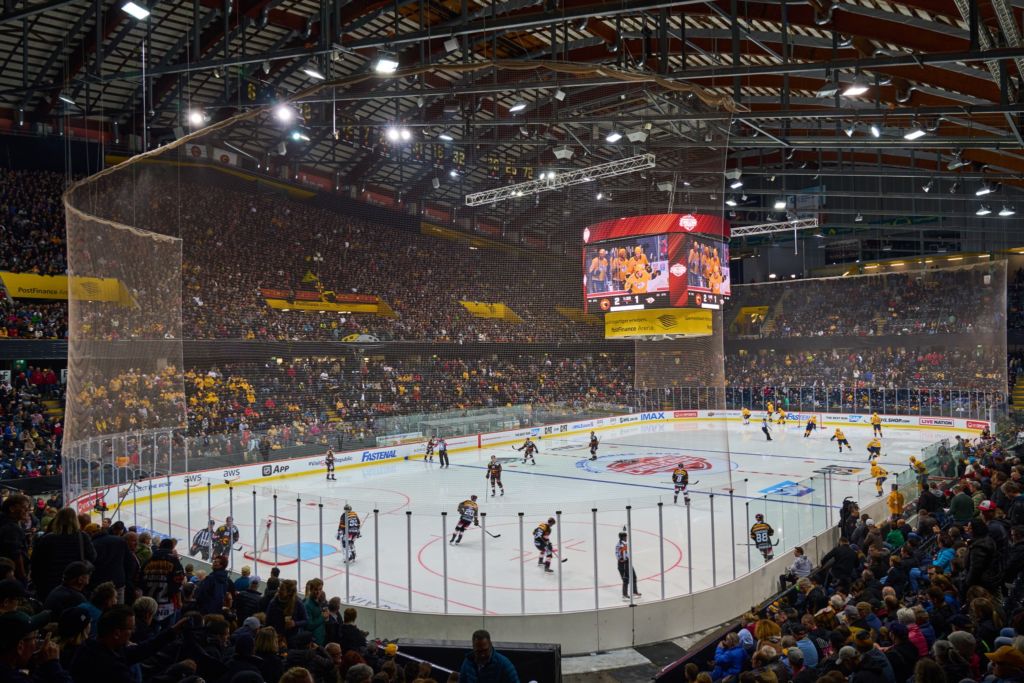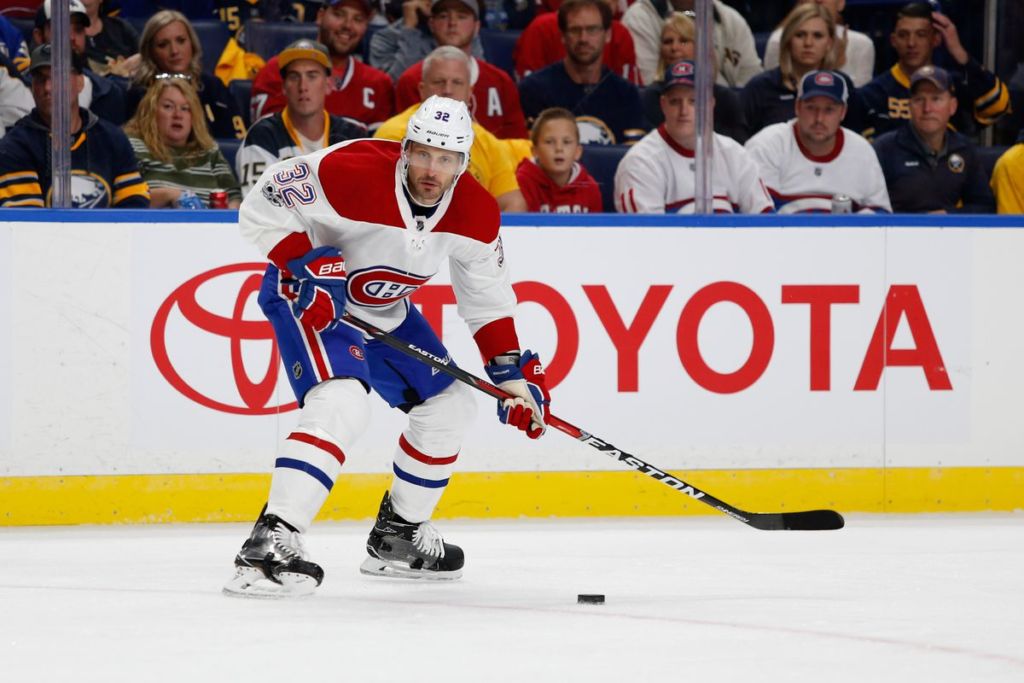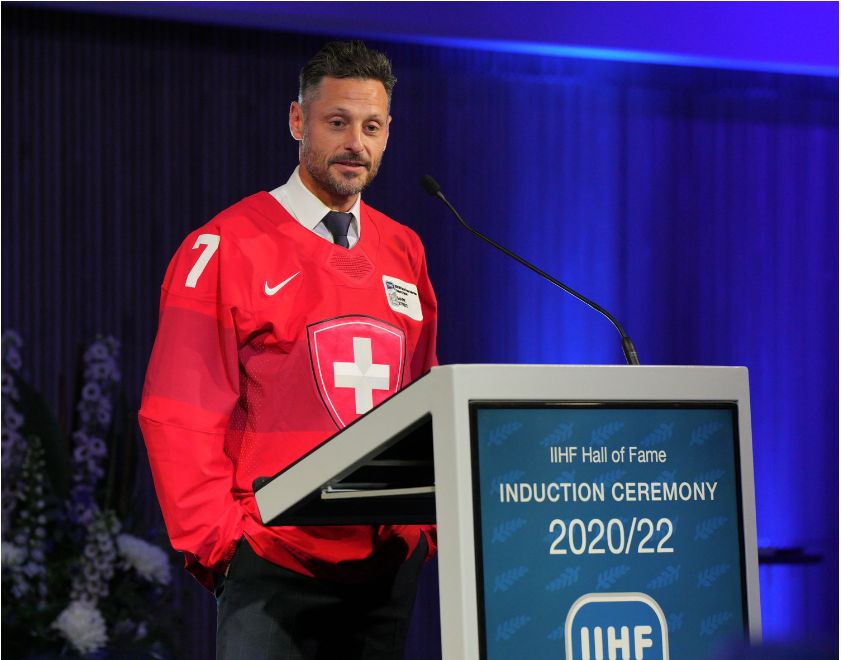
A boy from Bern who was not predicted to have a professional career
I was born and directly raised in the capital of Switzerland, in Bern, which has over 130 thousand inhabitants. I remember my very first contact with ice quite well. My parents and I often went on holidays to the mountains in the Bernese Oberland (the alpine region of the canton and the northern side of the Bernese Alps, including many of the highest peaks). There, I skated on a natural ice surface for the first time with my mother. I also remember quite well that when I was six or seven years old, I went to a FC Bern’s soccer practice. But I didn’t like it there. Not long after, my friend from school went to an ice hockey practice and I joined him. This step became fateful for me.
I was seven years old when I started playing for the SC Bern. It’s an extremely popular ice hockey club with the highest attendance in Europe. In addition to many nice experiences from my youth, one event stuck deep in my memory. When I was fourteen, my parents took me on a trip to San Francisco and we visited a game of the National Hockey League together. The home team was the rookie San Jose Sharks, and I don’t remember exactly who their opponent was, but I remember very well being excited at my first NHL game. It was my first tangible experience of the best league in the world. The arena, the fans and actually everything was fantastic. I didn’t mind at all that I was a die-hard Chicago Blackhawks fan until then. I cut out every report about this club from newspapers and watched the highlights on VHS tapes. Did I firmly decide after this experience that I wanted to play in the NHL? I had already known before what I wanted to achieve in life and it cannot be said that after this game I started to train even more or harder. However, this experience definitely inspired me even more. Although my father still claims that the game in San Jose was a “crap match” (laughs).
I gradually passed through all the youth categories of the SC Bern and had stayed at the club until I was sixteen. The 1993/94 season was my last for the club and I played it for the Bern juniors in the second highest league, because the juniors had been relegated from the elite Swiss league two years before. The fact that they did not play in the elite league was certainly not good for the club, but at the time there was another, much worse thing that happened to me. When I was sixteen, the Berne sporting director classified me as not good enough for the top Swiss league. We were eight defenders in the Elite B team and sporting director Bill Gilligan told me he thinks that seven are better than me and that he doesn’t see me as a prospect for the top league. That was hard to take. But I kept going.

That’s why I transferred to nearby Fribourg-Gottéron, whose juniors and men played in their respective elite leagues. There my hockey life completely turned around within a few months. The fact that French is the primary language in the city and ninety percent of French was spoken in the locker room was not a problem for me, because French is a school subject in Switzerland. I had some basics and after three months I was able to give interviews in French. In Fribourg, I played exclusively for the juniors in the first season and represented Switzerland at the Under-18 World Championships. In the following season, at the age of seventeen, I made my debut for the Fribourg-Gottéron men in the NLA.
I closed my entire youth hockey chapter in 1996. At the beginning of that year, the World Junior Championship was held in Boston, USA, and the coach of the Swiss national team was Arno Del Curto, who at the time coached the second division team of Luzern. Afterwards, Del Curto became the new coach of Davos in the top NLA from the 1996/97 season and I had two offers on the table in the summer. One from St. Cloud State University in Minnesota and the other from Davos. Arno Del Curto had impressed me already at the junior championship with his style, work and approach. He told me that if I transferred to Davos, he would give me a lot of time on ice. That’s why I finally chose to move to the east of our small country. And I did well.
Arno Del Curto and the disappointment in Utah
I had an incredible training drill with Arno Del Curto. Twice a day until we could barely stand on our feet, we were developing speed, skating technique, shooting and stick technique. In the gym, we worked on our strength and overall fitness condition. Also, from his internship in Russia, he brought an element which became the centerpiece of our training – plyometrics. Using this method, physical strength is converted into speed, which increases muscle elasticity and helps prevent injuries. These drills are very effective and extremely strenuous at the same time. We did it even on a game day with the belief that it would increase players’ speed endurance and give us enough strength in the third period or in overtime, which helped us a lot, especially in the playoffs. The intensity and speed of the game were Del Curto’s main priorities. He always wanted to push players’ capabilities to the limit and push them out of their comfort zone. I loved that. Today I know that this preparation helped me a lot in the future.
After four years in the NLA, I needed a new hockey challenge. In 1999, I signed a one-year contract with the Utah Grizzlies of the International Hockey League. At that time, I was very happy, but the moment I was standing with my parents and sister at the airport in Zürich, I fully realized that I was leaving my home country and my parents. I was completely overcome by emotions and it was very difficult to say goodbye. I realized that I was leaving everything behind and was going away for a long time, and I would have to rely only on myself. But I knew I wanted it and had to take this step. I landed in Salt Lake City and assumed someone from the club would be waiting for me at the airport. That didn’t happen, and that’s when I understood it was going to be a really tough test. In the end, although I was a Swiss national team player, but I only played one game for the Utah Grizzlies and sat in the stands all the rest. I spent the second half of that season with the Springfield Falcons of the American Hockey League and the Tallahassee Tigers Sharks of the East Coast Hockey League. The end at the Tiger Sharks was brutal: One morning I saw that my place in the cabin was empty. The equipment was outside the door, and the equipment attendant had stuffed it into a trash bag. That was the way I had been told that I was no longer needed. But during that year I understood that I was not ready for the NHL just yet and that I had to start working harder, get stronger and work on the balance of my game. I returned to my homeland with a clear plan – to become a better hockey player.
The first Swiss captain in the NHL and the winner of the Stanley Cup
After arriving in my homeland, I did not return to Davos, where Arno Del Curto was still coach, but I transferred to ZSC Lions. And I couldn’t imagine a better start in the largest Swiss city of Zürich,. We won a title in our first season and I ended up spending five seasons with the club. My hard work on and off the ice paid off. In the summer of 2004, I was drafted by the Montreal Canadiens, although I was 26 years old already and hockey players are usually drafted when they are eighteen. The 2004/05 season did not take place due to the strike, so I signed the contract with the Canadiens only the following summer as a 27-year-old! I went overseas again and the situation was exactly the same as in 1999 when I went to Utah. Nobody expected anything from me, because until then no other Swiss hockey player had established himself in the NHL. In the end it took me about a year and a half to deal with everything. The problem was not the language, I had a perfect command of it from Fribourg. Rather, it was a culture shock. The club of the Montreal Canadiens is influenced by many people, the importance of hockey in the francophone city is immense and the interest of the media is huge. And I also experienced a culture shock on the ice. The level was much higher, the game faster and harder than that I experienced at home. But the important thing was that I gradually built up my self-confidence and kept telling myself this sentence: “Hey, you belong here. You want to be here and nowhere else!”

Now I’ll digress a bit. I know that in the summer of 2022 the Slovak forward Juraj Slafkovský, who speaks only English, became the first draft pick. I don’t think the language should be a big problem for him. The Finnish forward Saku Koivu or all the Americans did not speak French either and played an important role in Montreal. However, when you can speak at least the basics of French, it will sound very good to the fans and the media. The language adaptation is certainly easier for a Swiss who has French as a school subject than for a Slovak who cannot utter a word. But if Slafkovský learns this new language, it will certainly be an advantage for him and the people of Montreal will appreciate it.
The third year in the Montreal Canadiens was successful for me and it was even my best year in the NHL ever. I finished third in the defender scoring with 62 points in 81 games, behind Nicklas Lidström and Sergej Gonchar. I received a lucrative five-year contract from the New York Islanders for $ 20.5 million. The first two seasons on Long Island were solid, but I’ll never forget the date of September 25th, 2010. I was 32 years old and I picked up the worst injury of my life. In the pre-season camp during the game: blue against orange, I fell on the boards after an innocent tackle by Matt Moulson and seriously injured my shoulder (dislocation). I had to miss the whole 2010/11 season and the doctors told me that the shoulder would never be the same. It took me eighteen months to come to terms with it physically and mentally.
Fortunately, after a serious injury, things turned in the right direction very quickly. Exactly one year after the operation, I was named the first Swiss captain in the NHL. It was both a challenge and an honor, and I tried to lead by example. When someone asks me what is the biggest difference between the role of a captain and a regular player, my answer is this. As a regular player, you can only focus on your world and your game. And if things are not going in a good direction, you hide in yourself. But as a captain, it is the whole picture that is in your focus, the team and your own performance. Being a captain was exciting and challenging at the same time. Especially in a team that often loses. In my era, it was the Islanders and it would definitely be easier if I could just focus on my own performance. But it was a big honor to lead this team.
After my challenging time in New York, a transfer to the Philadelphia Flyers came in handy. The atmosphere in the team was completely different and we made it to the playoffs twice in three years. On March 1, 2017, right before the transfer deadline, I experienced my only trade in the NHL. The Flyers traded me to a team that had even higher ambitions – the Pittsburgh Penguins. I played the entire 2016/17 regular season, but in the playoffs, Mike Sullivan put me in the stands and allowed me just three games in the knockout stages. This was hard to accept. But I did everything to help the team. And finally my dream came true. Pittsburgh beat the Nashville Predators in the finals, so I won the Stanley Cup right at the end of my career. It was the best feeling of my hockey life. All that hard work, sacrifice, perseverance and passion for the game finally paid off.
Just before turning forty, I announced the end of my career after twelve seasons in the NHL. Looking back, I’m glad I didn’t continue. Even though I still felt good and could extend my career in Davos. But hey: It’s an illusion to be able to retire at the right time. There is always the feeling that you either retired too early or too late.
Swiss national team and swingman
Of course, I cannot leave out the experience of representing my native country at the highest forum. My childhood dream was to play for Switzerland at the World Championships and the Olympics. When I started in the national team at the domestic World Championship in 1998, we were new to the elite division and unexpectedly finished fourth. And then there was an incredible period for me. I played in ten world championships in a row and Swiss ice hockey gradually became respected. Everything culminated in 2013, when my colleagues became vice-champions of the world. My greatest international experience remains the two Olympics. First in Turin 2006 where we ended up sixth and beat Canada in the group. I never thought we could do something like this. But I consider the Winter Olympics in Canada even one step higher. In Vancouver 2010, we played against native Canada and the USA, and it was something unforgettable. When I was inducted into the IIHF Hall of Fame during the 2022 World Championships in Finland, I was very honored.

I noticed that Wikipedia says that I was one of the few swingmen in the NHL. Yes, it can be said that I could also play as a forward. I played in all positions except the goalkeeper, I was in the first and fourth lines, I was a winger and a center. But I felt most comfortable in the position of an offensive defender.
New life challenges and health status
After finishing my career, I only took a short work break. I soon started working for the Swiss Ice Hockey Federation (SIHF). Since 2020, I have become a consultant and minority owner of my native club SC Bern. The club that has had the highest attendance in all of Europe since 2002. But the last three seasons have not gone well for us and we have a lot of work to do to get the club going again. I mainly help in the junior sector and try to ensure good structures. I also enjoy being on the ice with the juniors a few times a week. Besides this work, I have two other priorities. First, devoting time to my wife and two young daughters. We would like to travel a lot and see the world. The second task is to develop my Norqain watch business. I have been a fan of watches since a young age and followed the development of Swatch in the 80s and 90s with great interest. In Switzerland, the watch industry is a cultural heritage. I founded Norqain in 2018 with a good colleague who comes from the watch industry. We entered the market in 2019. And in 2022, we have already established ourselves in difficult times. Being an entrepreneur outside of sports is an amazing challenge.
People often ask me about my health after over 800 NHL duels and roughly 1,500 games at the highest level. I’ll probably illustrate it best with one example. For one season, I played with the Slovak defender Ľubomír Višňovský in the New York Islanders. He was a similar type of defender like me, otherwise a very pleasant person who played a similar number of games in his career. I heard he had about nine concussions. Some were weaker and others stronger. He started having bigger problems after he got into his thirties. Even after a mild concussion, it was very difficult for him to return to the ice. At the end of the last few seasons, he always had some kind of fracture, a back problem or concussion. Unlike Ľubomír, I still feel quite well. I was lucky enough to never have a concussion as a professional. My left shoulder remains slightly damaged. In 2010, I had a thorough operation on it. After my career ended, a second operation was necessary because I had fallen and torn my shoulder again. Now I have to take more care of it and strengthen it from time to time. But I’m pretty good at tennis, golf, and skiing. I am happy that I went through my career without any major damage to my health.
“I never let doubters sway me away. I followed my path, my dream. Everything is possible if you work hard and do it with passion.”


